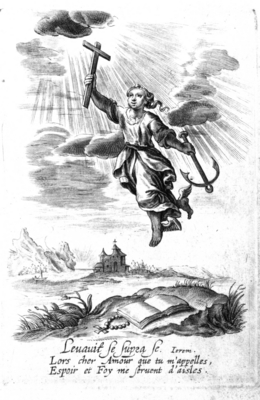Ludovicus van Leuven, Amoris divini et humani antipathia (1629)
Table of contents ↑Raptus Amoris [82]

XL.
Alu. paz.
Bonauent.
Ezech.8.
RAptus est mentis excessus, quo anima per vio-
lentiam quandam à sensibilibus auellitur &
ad diuinorum inspectionem & amorem eleuatur.
Est res hæc in initio plena timoris atque for-
midinis; quoniam anima in se existens nescit
quomodo, quasi à corpore seiungitur, & à suis
sensibus abscinditur, & in quandam regionem
peregrinam, sibique; penitus incognitam, non tam
ducitur, quam trahitur. in hoc autem posita est es-
sentia raptus, quod anima, contra modum suæ
naturæ ita celeriter & potenter ad superiora fera-
tur. habet quidem illa propensionem gratia con-
fortatam, vt Deum cognoscat, & diligat; sed ille
modus pergēdi in Deum sine adiutorio sensuum,
& cum tantâ spiritus vehementia, est illi prorsus
nouus, & à pusillitate naturalis conditionis alie-
nus. talis fuit raptus S. Francisci, qui visus est no-
cte, manibus ad modum crucis protensis, toto
corpore subleuatus à terrâ, & nubecul à quâdam
fulgente circumdatus, vt illustrationis mirabilis
intra mentem mira circa corpus perlustratio te-
stis esset. Emissa similitudo manus apprehendit eum in
concinno capitis sui; & eleuauit eum spiritus in-
ter terram & cœlum, & adduxit eum in Hierusa-
lem in visione Dei.
RAptus est mentis excessus, quo anima per vio-
lentiam quandam à sensibilibus auellitur &
ad diuinorum inspectionem & amorem eleuatur.
Est res hæc in initio plena timoris atque for-
midinis; quoniam anima in se existens nescit
quomodo, quasi à corpore seiungitur, & à suis
sensibus abscinditur, & in quandam regionem
peregrinam, sibique; penitus incognitam, non tam
ducitur, quam trahitur. in hoc autem posita est es-
sentia raptus, quod anima, contra modum suæ
naturæ ita celeriter & potenter ad superiora fera-
tur. habet quidem illa propensionem gratia con-
fortatam, vt Deum cognoscat, & diligat; sed ille
modus pergēdi in Deum sine adiutorio sensuum,
& cum tantâ spiritus vehementia, est illi prorsus
nouus, & à pusillitate naturalis conditionis alie-
nus. talis fuit raptus S. Francisci, qui visus est no-
cte, manibus ad modum crucis protensis, toto
corpore subleuatus à terrâ, & nubecul à quâdam
fulgente circumdatus, vt illustrationis mirabilis
intra mentem mira circa corpus perlustratio te-
stis esset. Emissa similitudo manus apprehendit eum in
concinno capitis sui; & eleuauit eum spiritus in-
ter terram & cœlum, & adduxit eum in Hierusa-
lem in visione Dei.

Rauissement de l'Amour.
XL.
Aynsi d'vn trait secret & d'vn pouuoir extreme,
Me vat ce cher amour rauissant à moy mesme
Et sortant mon esprit de la sphere des sens.
Rompons nostre prison, deliurons nous mon ame,
Laissons ce corps grossier, ne souffrons pas le blame,
De n'estre (l'ayant peu) sortiz de ces liens.
XL.
Aynsi d'vn trait secret & d'vn pouuoir extreme,
Me vat ce cher amour rauissant à moy mesme
Et sortant mon esprit de la sphere des sens.
Rompons nostre prison, deliurons nous mon ame,
Laissons ce corps grossier, ne souffrons pas le blame,
De n'estre (l'ayant peu) sortiz de ces liens.
Translations
 |
Rapture of love. |
 |
He lifted himself above himself. |
Sources and parallels
-
Parallel for the pictura (exact copy), the Latin bible quote and the French epigram in:Niet hoog nog wyd, maar daar gy zyt [26]
 (in: Jan van Hoogstraten, Zegepraal der goddelyke liefde (1709)
(in: Jan van Hoogstraten, Zegepraal der goddelyke liefde (1709) )
[Compare
)
[Compare ]
]
References, across this site, to this page:
- Niet hoog nog wyd, maar daar gy zyt [26]
 (in: Jan van Hoogstraten, Zegepraal der goddelyke liefde (1709)
(in: Jan van Hoogstraten, Zegepraal der goddelyke liefde (1709) )
)

